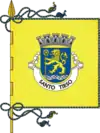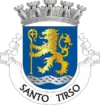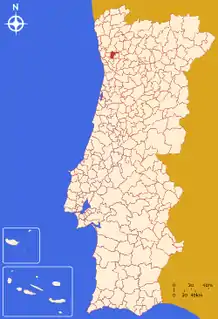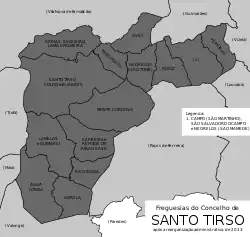Santo Tirso
Santo Tirso (Portuguese pronunciation: [ˈsɐ̃tu ˈtiɾsu] (![]() listen)) is a city and municipality located in the north of Porto Metropolitan Area, 25 km from central Porto, Portugal. In the region, the Ave Valley, there is a large center of textile industry. The population in 2011 was 71,530,[1] in an area of 136.60 km².[2]
listen)) is a city and municipality located in the north of Porto Metropolitan Area, 25 km from central Porto, Portugal. In the region, the Ave Valley, there is a large center of textile industry. The population in 2011 was 71,530,[1] in an area of 136.60 km².[2]
Santo Tirso | |
|---|---|
.jpg.webp) Basílica de Nossa Senhora da Assunção | |
 Flag  Coat of arms | |
 | |
| Coordinates: 41°20′N 8°28′W | |
| Country | |
| Region | Norte |
| Metropolitan area | Porto |
| District | Porto |
| Parishes | 14 |
| Government | |
| • President | Joaquim Couto (Since 2013) (PS) |
| Area | |
| • Total | 136.60 km2 (52.74 sq mi) |
| Population (2011) | |
| • Total | 71,530 |
| • Density | 520/km2 (1,400/sq mi) |
| Time zone | UTC±00:00 (WET) |
| • Summer (DST) | UTC+01:00 (WEST) |
| Website | http://www.cm-stirso.pt |
Another important center in the municipality is Aves.
The Santo Tirso Monastery built in 978 is a point of interest.
History
The History of Santo Tirso is tied to its benedictine monastery. The town grew around it and, from 978 until 1834, it was a "couto" - a neutral area that belonged to the clergy.[3] Known initially as Santo Tirso de Riba de Ave, this city has been the capital of a municipality at least since 1833.[4] Its composition changed throughout the years, especially in 1998, when the nearby city of Trofa created its own municipality, taking some of Santo Tirso's towns with it.[5]
Towards the middle of the 19th century, Santo Tirso spearheaded the industrialization of the Ave Valley. One of the first textile factories in the region, the Fábrica de Fiação e Tecidos do Rio Vizela, opened in Vila das Aves, part of its municipality, in 1845. This factory would become the largest of its kind in Portugal, with an area of about nine square kilometres and employing, at one point, over 3.000 people.[6]
Geography
The highest point in the municipality is in the Alto de S. Jorge, in the parish of Refojos, with 527 meters of altitude. The municipality's current perimeter is 69 kilometres (43 miles).
Parishes

Administratively, the municipality is divided into 14 civil parishes (freguesias):[7]
- Agrela
- Água Longa
- Areias, Sequeiró, Lama e Palmeira
- Aves
- Campo (São Martinho), São Salvador do Campo e Negrelos (São Mamede)
- Carreira e Refojos de Riba de Ave
- Lamelas e Guimarei
- Monte Córdova
- Rebordões
- Reguenga
- Roriz
- Santo Tirso, Couto (Santa Cristina e São Miguel) e Burgães
- São Tomé de Negrelos
- Vilarinho
Sports
Santo Tirso is home of the historic football club Futebol Clube Tirsense and C.D. Aves.
References
- Instituto Nacional de Estatística
- Eurostat
- https://www.infopedia.pt/$santo-tirso
- https://www.cm-stirso.pt/viver/municipio/caraterizacao/historia
- Município da Trofa - História
- https://pontosdevista.pt/tag/fabrica-de-fiacao-e-tecidos-do-rio-vizela/
- Diário da República. "Law nr. 11-A/2013, page 552 109" (pdf) (in Portuguese). Retrieved 30 July 2014.
External links
| Wikimedia Commons has media related to Santo Tirso. |